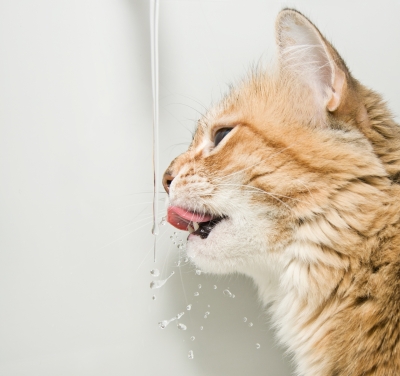- Provide cool drinking water stations throughout the house. Drinking is one of the main ways cats cool themselves down when they get hot.
- Try a water fountain if your cat prefers running water, you can also add ice cubes.
- Make sure your cat has a cool, shady place to lounge. Instead of a heating pad, wrap up a frozen water bottle in a blanket and place it where your cat likes to spend time.
- Start your fans and open up windows (make sure there is a screen!)
- Prepare a frozen treat using low sodium meat broth and water. Freeze in ice cube tray, then serve in a bowl with some canned food or plain. If you are feeling more adventurous, fill your ice cube tray with blenderized canned food. Let thaw for a few minutes before serving and garnish with catnip ????
- Consider keeping outdoor cats inside especially if you are not home to supervise and any time there are heat warnings or a high UV index. If your cat travels with you, remember that just a few minutes in a hot car is all it takes to develop heat stroke! To report a pet in a hot vehicle call 310-SPCA in Ontario or contact your local police department.
For more info, visit http://www.nohotpets.ca - If your pet spends time outside, consider creating an outdoor exercise pen with an umbrella cover to shield your pet from harmful rays.
- Prolonged sun exposure can lead to painful sunburns and cancer. Areas most at risk are the ears, temples, nose and belly where there is less fur. Hairless breeds and cats with light coloured, fine fur have a greater chance of getting sunburn. It is best to avoid sun exposure between the peak hours of 10 am – 2pm. Ask your veterinarian about a safe sunscreen option for your cat, and never use salicylate containing sunscreens as these are toxic to cats!
- Indoor cats are at risk too! UV light that comes through our windows can cause your cat to burn. During times when the sun is strongest, draw the blinds partially, or, consider a UV film for your window.
Cats are natural born sun seekers, but even they can suffer from heat stroke and sunburns. Read on to help your cat beat the summer heat!


